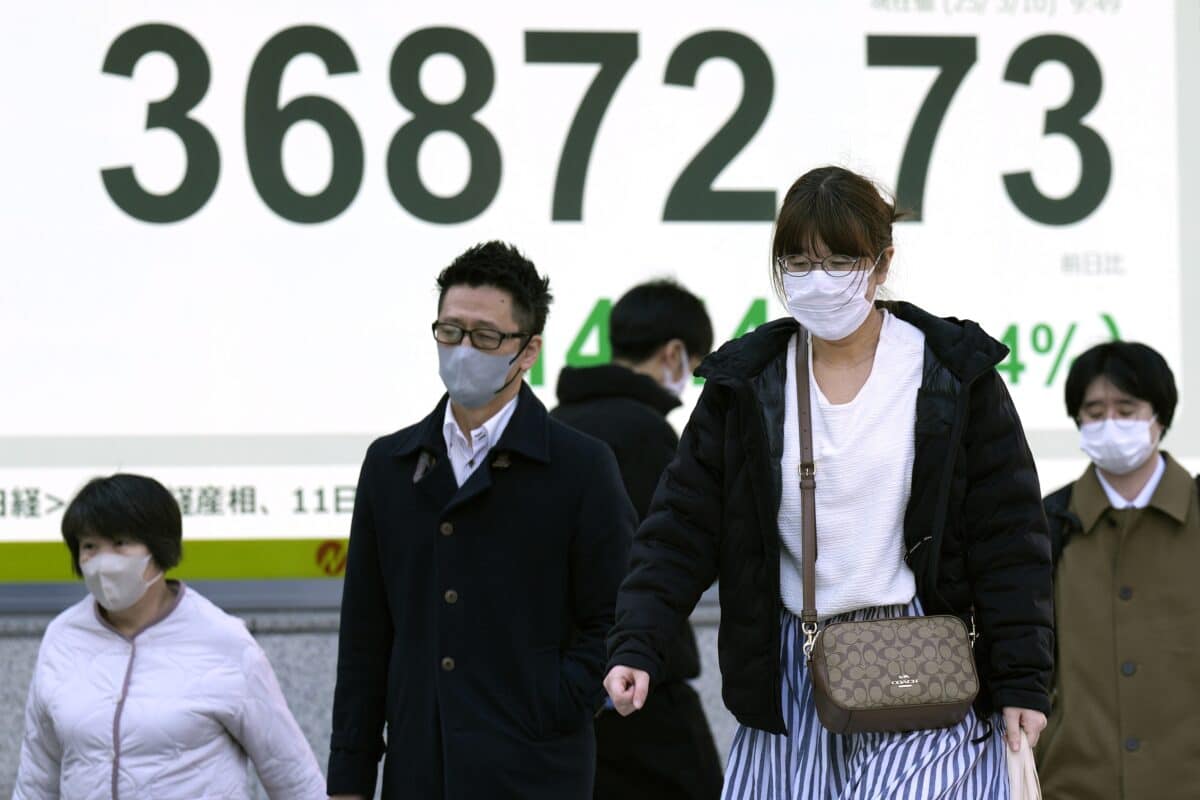European shares fall, Asian stocks are mixed amid worries over tariffs

People walk in front of an electronic stock board showing Japan’s Nikkei index at a securities firm Monday, March 10, 2025, in Tokyo. (AP Photo/Eugene Hoshiko)
BANGKOK — European shares dropped Monday after a mixed trading session in Asia as uncertainty persisted over what President Donald Trump will do with tariffs.
Germany’s DAX lost 0.6 percent to 22,874.88, while the CAC 40 in Paris declined 0.3 percent to 8,098.98. Britain’s FTSE 100 shed 0.3 percent to 8,653.22.
The future for the S&P 500 was down 1 percent while that for the Dow Jones Industrial Average lost 0.8 percent.
Shares in China led losses in Asia, with Hong Kong’s Hang Seng index down 1.9 percent at 23,783.49. The Shanghai Composite index shed 0.2 percent to 3,366.16.
READ: Consumer prices fell in China in February
In the latest sign of weakness for the world’s second-largest economy, consumer prices fell in China in February for the first time in 13 months, the government reported Sunday, as persistent weak demand was compounded by the early timing of the Lunar New Year holiday.
In Tokyo, the Nikkei 225 gained 0.4 percent to 37,028.27. Japan’s trade minister, Yoji Muto, was visiting Washington for talks on ways to avert higher U.S. tariffs on Japanese exports of steel, aluminum, and automobiles.
“Taking into account the voices we have heard from the industrial sector, we would like to hold discussions that will be a win-win for both Japan and the U.S.,” Muto told reporters late last week.
U.S. Commerce Secretary Howard Lutnick said on NBC’s “Meet the Press” that 25-percent tariffs on steel and aluminum imports will take effect Wednesday.
READ: Trump orders big tariffs on steel, aluminum; markets roiled
Elsewhere in the region, Australia’s S&P/ASX 200 was up 0.2 percent at 7,962.30, while the Kospi in South Korea gained 0.3 percent to 2,570.39.
Taiwan’s Taiex lost 0.5 percent and the Sensex in India fell 0.3 percent. Bangkok’s SET slipped 1.7 percent.
On Friday, Wall Street rose after a wild ending to a brutal week of scary swings dominated by worries about the US economy and uncertainty about what President Donald Trump will do with tariffs.
The S&P 500 climbed 0.6 percent, storming back from an earlier loss that had reached 1.3 percent. That followed a punishing stretch where it swung more than 1 percent, up or down, for six straight days.
The Dow industrials added 0.5 percent and the Nasdaq composite rose 0.7 percent. Last week was the worst for the S&P 500 since September and it left the index a little more than 6 percent below its all-time high set last month.
The head of the Federal Reserve helped ease the market’s worries on Friday afternoon after saying he thinks the economy looks stable at the moment, and he doesn’t feel pressure to cut interest rates in order to prop it up.
“The costs of being cautious are very, very low” right now, Powell said about holding steady on interest rates. “The economy is fine. It doesn’t need us to do anything really. We can wait, and we should wait.”
US Labor Department said Friday that US employers added 151,000 more jobs last month than they cut. That was slightly below economists’ expectations, but it was an acceleration from January’s hiring.
Recent, discouraging surveys had shown souring confidence for US businesses and households because of uncertainty around Trump’s tariffs, and economists were waiting to see if Friday’s report would show if that was translating into real pain for the economy and job market.
The whiplash actions from the White House on tariffs — first placing them on trading partners and then exempting some and then doing it again — have raised uncertainty for businesses.
That sparked fears businesses might freeze in response to what they have described as “chaos” and pull back on hiring. US households, meanwhile, are bracing for higher inflation because of tariffs, which is weakening their confidence and could hold back their spending. That would sap more energy from the economy.
Trump said Friday he wants tariffs to bring jobs back to the United States, and he gave no indication more certainty is imminent for financial markets.
“There will always be changes and adjustments,” he said in comments from the Oval Office.
In other dealings early Monday, US benchmark crude oil was unchanged at $67.04 per barrel. Brent crude, the international standard, gained 7 cents to $70.43 per barrel.
The US dollar slipped to 147.24 Japanese yen from 147.94 yen. The euro rose to $1.0844 from $1.0836.